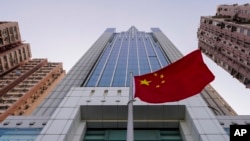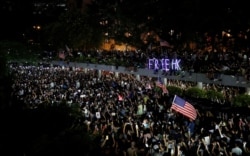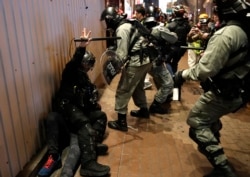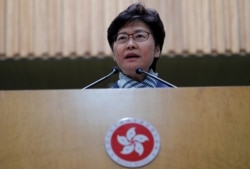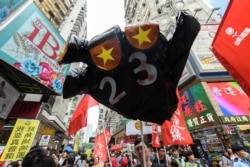China's top official in Hong Kong told the semi-autonomous city on Wednesday to urgently enact a national security law, shelved since 2003, to combat what he called violence, foreign interference and pro-independence forces. The comments come amid concern by pro-democracy lawmakers of China's interference in the territory's internal affairs, including the legislative council and judiciary.
"[Hong Kong] must make efforts to safeguard national security in the legal system and at implementation level … and ensure Hong Kong does not become a window of risk for national security," Luo Huining, the head of Beijing's liaison office in Hong Kong, said in a video clip released to mark China's National Security Education Day.
The "violent, criminal acts by pro-independence and radical forces" in the anti-government protests which erupted last June have damaged the rule of law and challenged the foundation of the "one country, two systems" principle, said the former top Communist Party leader in China's Shanxi province.
The demonstrators took to the streets to demand the full withdrawal of a controversial extradition bill and the resignation of the territory's chief executive, Carrie Lam. The measure was belatedly withdrawn in October. The protesters also made "five demands" of city officials that included calls for an investigation of police abuse of protesters.
More than 7,000 people were arrested in the months-long anti-government protest movement in which police fired live rounds, tear gas and rubber bullets and used severe beatings to deal with protesters. Some protesters retaliated with Molotov cocktails, setting fire to objects and wrecking shops seen as pro-China.
The Chinese government maintains that foreign governments such as the United States and Britain supported and fueled the Hong Kong protests in a ploy to undermine the stability of China.
The protests posed one of the greatest challenges to Chinese President Xi Jinping since he took office in 2012. The Chinese government had supported the extradition proposal and accused protesters of colluding with Western governments.
Separately, Luo Huining said that even during the ongoing fight against the coronavirus pandemic, people have staged protests by setting fires, blocking roads and making explosives to threaten the community's safety. He said if these acts are not stopped, they would escalate and threaten national security.
"If the anthill that erodes the rule of law is not busted, the dam of national security will be ruined," he said.
Reaction by Lam
Separately, Lam said the months-long anti-government movement which she said involved illegal protests, "cold-blooded hate speech" and "extremist acts close to terrorism" had challenged the rule of law and endangered public safety.
"Extremist actions that are close to terrorism emerged, including homemade bombs, possession of firearms and attacks on police officers," she said in a separate video clip to mark the National Security Education Day.
"If these illegal acts are not effectively curbed, they may escalate to a level which threatens national security," she said.
Lam said the Hong Kong government is determined to safeguard its safety and stability and will be responsible to the city as well as the Chinese government.
This week, pro-democracy lawmakers accused the Chinese government of "blatant intervention" after its Hong Kong and Macau Affairs Office said some lawmakers were guilty of misconduct in public office for delaying bills in the legislature by filibustering. Lam rejected claims of interference from Beijing in local affairs, which is barred by the city's post-handover mini-constitution.
Article 23
Hong Kong Security Secretary John Lee said on Wednesday that the seizure of explosives by the police in recent months indicated a growing threat, with the pattern resembling terrorism in foreign countries. He said the government would try to create a "favorable environment" to pass the Article 23 national security law.
Article 23 of Hong Kong's constitution, the Basic Law, said the city shall enact legislation to prohibit acts of "treason, secession, sedition, subversion" against the Chinese government and "theft of state secrets."
The Hong Kong government tried to pass anti-subversion laws in 2003 but shelved the plan after a mass protest. The Chinese government has pressured it ever since, particularly amid political tensions, to reintroduce the law.
Veteran political analyst Chris Yeung said China's hard-line approach toward the territory has made Hong Kongers feel increasingly alienated. Yeung said China's involvement in the city's political affairs only makes people feel the "one country, two systems" policy promised in the 1984 Sino-British Joint Declaration has in fact become "one country, one system or 1.5 systems."
"Is China's escalation of Hong Kong's political controversies to the national security level a sign of further crackdown on the city's existing freedoms?" Yeung questioned.
Upcoming election
China warned in a 2014 policy white paper that it has "comprehensive jurisdiction" over Hong Kong and the city's "high degree of autonomy … comes solely from the authorization by the central leadership."
Kong Tsung-gan, a writer and activist, said he believed the officials' remarks are meant to intimidate the pro-democracy movement before the local legislature's election in September.
"All I can see is they're preparing the way to do something really drastic if the Legislative Council does go majority pro-democracy," he said on Twitter. "Are they trying to frighten us? Who do they think they are talking to?" he asked.
This week, the Reuters news agency quoted senior judges in Hong Kong as saying the independence of the city's courts was at peril under pressure from Beijing. Judges and lawyers say Beijing is trying to limit the courts' authority to rule on core constitutional matters, while state-controlled media on the mainland have warned Hong Kong judges not to "absolve" arrested protesters.
The former British colony was granted special autonomy for 50 years after it returned to Chinese sovereignty in 1997. Many in Hong Kong are concerned China is slowly encroaching on those rights and tightening its grip on the territory.




